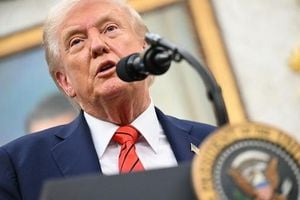Brazil’s financial sector is facing a wave of uncertainty and anxiety after a series of dramatic events linked to the US Magnitsky law sanctions. On August 19, 2025, shares of major Brazilian banks and financial firms plummeted, reflecting mounting fears that the United States’ aggressive sanctions regime could soon entangle local lenders in a web of legal and financial complications. The drop followed a crucial ruling by Minister Flávio Dino of Brazil’s Federal Supreme Court (STF), who declared that foreign executive and judicial orders would not have automatic effect in Brazil—a decision that has left financial executives scrambling to understand its implications.
According to Bloomberg, Banco do Brasil SA’s shares closed down a staggering 6% in Sao Paulo, while Banco BTG Pactual SA’s stock fell 3.5%. Banco Bradesco SA’s preferred shares weren’t spared either, declining 3.4% by the end of the day. The tremors reached across the Atlantic, with XP Inc.—which had just announced its second-quarter results—seeing its shares end 8.6% lower in New York. Nu Holdings Ltd. also felt the impact, its shares closing down 1.6%.
What’s driving this turmoil? The answer lies in a complex intersection of international law, US sanctions policy, and the recent inclusion of Brazilian Supreme Court Minister Alexandre de Moraes on the US Treasury’s list of sanctioned individuals under the Magnitsky Act. The Magnitsky Act, originally designed to target human rights violators and corrupt officials, has become a powerful tool for the US to exert global pressure—and its reach is now being felt in Brazil’s boardrooms.
History offers a cautionary tale. Over the past decade, the US government has fined foreign banks more than $10 billion for failing to comply with American sanctions, according to a report from InfoMoney. These penalties have mostly targeted violations of embargoes against countries such as Iran, Cuba, Sudan, Myanmar, Syria, and Zimbabwe. The message from Washington has been clear: process sanctioned transactions through the US financial system, and you’ll pay a hefty price.
One high-profile example came in 2019, when Standard Chartered Bank (SCB) agreed to pay more than $1.1 billion to settle allegations that it had processed over 9,000 transactions—totaling $437 million—for clients linked to Iranian commerce and oil companies. These transactions, carried out between June 2009 and May 2014, were routed through SCB’s New York office, triggering alarms at the US Treasury’s Office of Foreign Assets Control (OFAC). The agency argued that SCB had enabled customers in sanctioned countries, including Myanmar, Cuba, Iran, Sudan, and Syria, to access the global financial system via its Dubai branch and online banking tools.
SCB’s troubles didn’t end there. The bank was also accused of facilitating transactions for entities and individuals designated as Specially Designated Nationals (SDNs) in Zimbabwe between May 2009 and July 2013. The US government maintains a running list of such individuals and organizations, and the consequences for violating these restrictions can be severe.
BNP Paribas, one of France’s largest banks, faced an even steeper punishment in 2014. The bank was fined $8.9 billion for violating US sanctions against Iran, Cuba, and Sudan. According to InfoMoney, BNP Paribas intermediated more than $8.8 billion in transactions from these countries, including $4.3 billion from entities that were explicitly prohibited. The fallout was swift and severe: the bank was accused of falsifying arguments and hiding information from US authorities, and ultimately fired 13 employees, including its head of financial operations.
Now, with Minister Alexandre de Moraes added to the US sanctions list under the Magnitsky Act, Brazilian financial institutions are bracing for the possibility that they could be the next targets. The anxiety is palpable among banking executives. As reported by InfoMoney, one executive, speaking anonymously, summed up the dilemma: “Let’s suppose new sanctions come. If the Supreme Court authorizes, ok, we are even with Brazil and abroad. But if the Supreme Court says, don’t do, what will happen?” The executive added, “A bank that breaks up the OFAC sanctions can’t survive.”
The uncertainty was compounded by Minister Flávio Dino’s ruling that foreign executive and judicial orders will not have automatic effect in Brazil. While this move was intended to assert Brazilian sovereignty and protect local institutions from foreign legal overreach, it’s left many financial leaders wondering how to navigate the conflicting demands of Brazilian and US law. If Brazil’s Supreme Court forbids compliance with a US order, but the US insists on enforcement, banks could find themselves caught between a rock and a hard place—risking either massive fines abroad or legal trouble at home.
According to InfoMoney, Brazilian companies have already begun discussing strategies to address this new reality. Some are considering requesting further clarification from the Supreme Court on how these cases will be handled, especially when it comes to clear-cut issues like sanctions against drug traffickers and terrorists. Others are exploring contingency plans to shield themselves from potential US retaliation. The stakes are high: as history has shown, the penalties for non-compliance can be devastating, not just in terms of fines but also reputational damage and loss of access to the global financial system.
For now, the Brazilian financial sector is in a holding pattern, anxiously awaiting further guidance from both Brasília and Washington. The recent stock market rout is a stark reminder of how interconnected—and fragile—the global financial system has become. A single sanctions designation in Washington can send shockwaves across continents, wiping billions off market capitalizations and throwing business plans into disarray.
Yet, as one executive’s rhetorical question suggests, the real test may come if and when US and Brazilian authorities issue directly contradictory orders. Will Brazilian banks risk US wrath by refusing to comply with OFAC? Or will they defy their own courts and government, potentially inviting domestic legal action? It’s a scenario that no one in the financial sector relishes, but one that seems increasingly plausible given the current trajectory.
The coming weeks and months will likely see intense lobbying, legal wrangling, and perhaps even diplomatic negotiations as Brazil’s financial sector seeks a way through the thicket of international sanctions law. For now, all eyes are on the STF and the US Treasury, as bankers, investors, and regulators alike try to chart a course through these uncertain waters.
No one knows exactly how this standoff will play out, but one thing is certain: the era when Brazilian banks could ignore US sanctions as a distant problem is over. The world is watching, and the stakes—for Brazil’s economy and its place in the global financial system—could hardly be higher.




